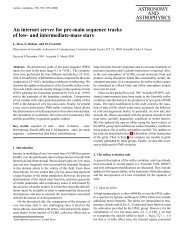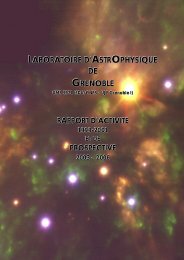Untitled - Laboratoire d'Astrophysique de l'Observatoire de Grenoble
Untitled - Laboratoire d'Astrophysique de l'Observatoire de Grenoble
Untitled - Laboratoire d'Astrophysique de l'Observatoire de Grenoble
You also want an ePaper? Increase the reach of your titles
YUMPU automatically turns print PDFs into web optimized ePapers that Google loves.
data to verify the predictions we are making today regarding the structure and evolution of protoplanetary disks<br />
(e.g., dust settling, grain growth, planetesimal formation). PLANET FINDER and VITRUV will complete these<br />
data sets and mo<strong>de</strong>ls by providing images with unprece<strong>de</strong>nted resolution and contrast.<br />
One aspect of our activities that will be new is the study of mineralogy in disks. With instruments like NACO,<br />
VISIR, and SPITZER, we expect to improve our knowledge of the dust properties in disks (size, composition).<br />
This is nee<strong>de</strong>d to remove the usual assumption that grains are ISM-like and spherical in disks...<br />
In the field of IMF and low-mass stars we will push further our studies of the substellar populations<br />
by looking for planet-mass objects with large surveys like UKIDSS and the WIRCAM Key project we have<br />
proposed. In the Galactic field, the CFHT-LS will be exploited (and completed by programmes led by FOST<br />
members) to look for the coolest objects, the T-dwarfs and the ammonia-dwarfs (or Y-dwarfs).<br />
In parallel with statistical studies, we consi<strong>de</strong>r it important to start studying the individual properties<br />
of these poorly known objects. Masses, metallicities, effective temperatures, etc., will be gathered. Their<br />
atmospheres will be probed by polarimetry (already started, e.g., Ménard et al. 2002) and spectroscopy. We<br />
do no have the expertise yet for the interpretation of planetary atmospheres. Filling that gap is a priority.<br />
In the field of Extra-Solar planets the search for extremely low-mass companions will continue and their<br />
characterisation will ramp up in our work load. With the current instrumentation, these companions offer pretty<br />
much our only chance to <strong>de</strong>tect direct photons from a planet-mass object external to our Solar system. Much<br />
has to be learnt.<br />
HARPS on the ESO 3.60m and soon SOPHIE at OHP will also improve our sample of planets around M<br />
and A dwarfs to a point where statistical studies and follow-ups will become possible. We expect to play a<br />
leading role in both aspects. Both programmes are very recent. They were <strong>de</strong>scribed in our activity report and<br />
will be carried on for most of the period covered by the present research plan.<br />
To characterise the exo-planets, interferometry will play a large role in our future programmes. It will be<br />
used to <strong>de</strong>rive astrometric masses for numerous objects (with PRIMA for example).<br />
7.2 Needs in personnel<br />
The range of expertise within FOST is broad. New results, often at the very forefront of competitive fields,<br />
are obtained regularly by FOST and progress is being ma<strong>de</strong> rapidly. It is therefore difficult, at the present<br />
time, to know exactly what our needs will be terms of personnel in the years to come. Still, a few “profiles”<br />
are emerging, involving specific expertise, that would fulfill forecasted needs in FOST. But by no means should<br />
these few “profiles” be consi<strong>de</strong>red <strong>de</strong>finitive or restrictive. Actually, there is much to bet that new needs will<br />
emerge as we make progress, as is normal in science.<br />
It is easy to imagine that very specific competences to <strong>de</strong>al with continuum radiative transfer (for Herschel<br />
& ALMA) coupled with PLANET FINDER and VITRUV might become nee<strong>de</strong>d. Similarly, the latter two<br />
instruments might trigger the need for a data reduction specialist in high contrast, high resolution imaging to<br />
favor full scientific return. On the other hand, <strong>de</strong>aling with extremely large databases (like those involved in<br />
our current surveys) also requires very specific competences that might become critical a few years down the<br />
road. So clearly, new needs will emerge that we cannot predict today.<br />
Nevertheless, a few profiles can be i<strong>de</strong>ntified today that would fulfill needs within FOST. They should be<br />
seen as a starting point for our list of requirements in personnel.<br />
• Detection of exoplanets and statistical properties (urgent: 2007-2008)<br />
The French planet hunters have access to the best instruments to measure radial velocities (e.g., SOPHIE<br />
& HARPS). These efficient spectrographs allow to study large samples. Statistical properties can be<br />
<strong>de</strong>rived and planet formation theories tested. LAOG is leading the search for planets around M- and<br />
A-dwarfs in Europe. The analysis work is done as part of two PhD thesis currently un<strong>de</strong>r way in FOST<br />
102




